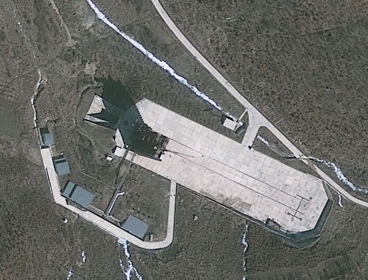The U.S. and North Korea appear to be heading toward another stalemate as Pyongyang quickens preparations for a long-range rocket launch in breach of their recent agreement on nuclear and missile tests.
A senior U.S. defense official said Wednesday that Washington had been forced to suspend its planned provision of food aid to the impoverished state, which is sticking to its launch plan despite growing international opposition.
“We have been forced to suspend our activities to provide nutritional assistance to North Korea largely because we have now no confidence about the monitoring mechanisms that ensure that the food assistance goes to the starving people and not the regime elite,” Peter Lavoy, acting assistant secretary of defense for Asia and Pacific security affairs, told a congressional hearing.
His remarks came as some news reports circulated that the North had already moved the main body of the rocket to the launch site on its west coast and begun injecting fuel into it. The reports also said the launch is likely to occur on April 12 or 13.
A senior Cheong Wa Dae official dismissed the reports, stressing that the fueling process will begin one or two days before the launch, which the North said will take place between April 12 and 16.
“Technically speaking, the rocket can’t wait for a week or so after the fuel injection. After erecting the rocket, the fuel will be injected right before the launch,” he told reporters.
Earlier this month, the North said that it would launch a satellite on a long-range rocket to mark the centennial birthday of its founding father Kim Il-sung, which falls on April 15.
Pyongyang agreed with Washington on Feb. 29 to temporarily halt uranium enrichment at its main nuclear complex in Yongbyon and put a moratorium on nuclear and missile tests in return for 240,000 tons of nutritional assistance, as a pre-step for the resumption of the multilateral denuclearization talks.
Washington was apparently taken aback as the deal was reached in part due to domestic political goals of both sides, experts said. The U.S. wanted stability on the peninsula in an election year while the North needed outside aid to help its new leader Kim Jong-un, they said.
Despite international support President Lee rallied during the Nuclear Security Summit here to pressure the North to cancel the launch plan, the North said Tuesday it would never give it up. It stressed a sovereign nation has the “legitimate right” to conduct the launch.
“(The U.S.) should have the courage to recognize our right to launch a satellite in the same way it deals with other nations, putting aside its confrontational concept that attempts to block our road ahead,” it said in a statement.
Despite the U.S. move to stop food aid, experts said Pyongyang will push ahead with its launch plan.
“Should the launch succeed in putting the satellite into orbit, it could help boost its bargaining power, as it means the North has reached the final stage of intercontinental ballistic missile development. Even if it fails, should it succeed in extending the missile range, it could be called a success,” said Cheong Seong-chang, senior fellow at the local think tank Sejong Institute.
“At a time the North prepares to officially complete the hereditary power succession process in April, the launch can be used as a congratulatory event. In some sense, the North has more to gain even though it will have to give up food aid from the U.S.”
Regarding the launch plan, the leaders of the U.S., China, Russia and South Korea showed rare unity while they gathered here for the two-day Nuclear Security Summit that ended on Tuesday.
U.S. President Barack Obama reiterated that North Korea would face the consequence of deeper isolation with the launch and would not be rewarded for “bad behavior.” He also stressed that the pattern of launching provocations and winning rewards should be broken.
Chinese President Hu Jintao and Russian President Dmitry Medvedev also urged the North to refrain from the launch and focus on enhancing the livelihoods of its people.
Nam Chang-hee, political science professor at Inha University, said that Washington may mobilize a set of punitive measures should the North go ahead with the launch plan.
“The U.S. may make diplomatic efforts such as using China to pressure the North in line of its stance that the North will not be rewarded for bad behavior, which is breaking its earlier commitments. It can track down Kim Jong-un’s financial assets abroad and freeze them as it did in the past,” he said.
“The U.S. may also seek to strengthen cooperation among South Korea, the U.S. and Japan and make more concrete steps to develop a missile defense system in the region, which could pressure China to exert its influence over the North.”
Lee Dae-woo, senior fellow at Sejong Institute, also noted that China can use its influence to bring the North on the right path. China reportedly plans to send former Chinese Foreign Minister Li Zhaoxing to the North in April to express Beijing’s concerns over the launch plan.
“Pyongyang could change its stance if the senior Chinese official should offer a strong message. In 2003, China was reported to have stopped providing oil to the North temporarily to pressure it while saying that the stoppage was due to problems with the pipeline,” he said. “Such strong measures can help change the North.”
By Song Sang-ho (
sshluck@heraldcorp.com)





![[Exclusive] Hyundai Mobis eyes closer ties with BYD](http://res.heraldm.com/phpwas/restmb_idxmake.php?idx=644&simg=/content/image/2024/11/25/20241125050044_0.jpg)
![[Herald Review] 'Gangnam B-Side' combines social realism with masterful suspense, performance](http://res.heraldm.com/phpwas/restmb_idxmake.php?idx=644&simg=/content/image/2024/11/25/20241125050072_0.jpg)

